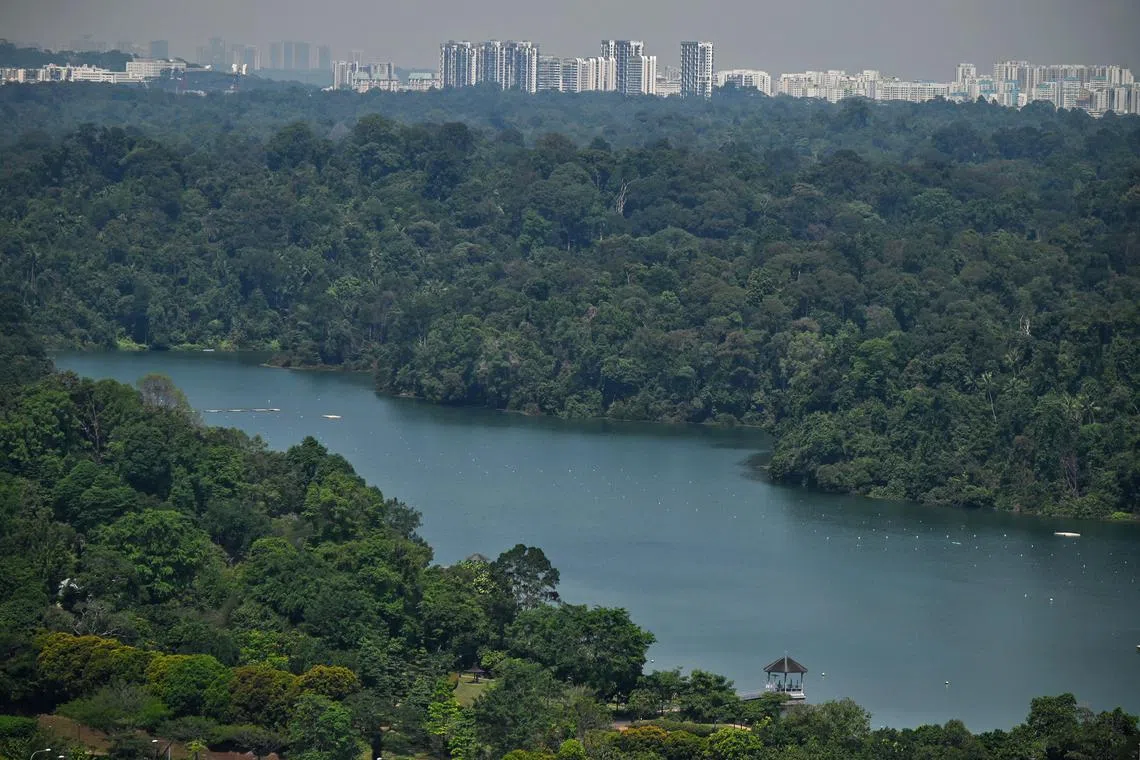Balance between ambition and practicality needed to achieve climate goals, says Teo Chee Hean
Sign up now: Get ST's newsletters delivered to your inbox

The Government will strike a balance between “ambition and practicality of action” to meet Singapore’s climate targets.
ST PHOTO: KUA CHEE SIONG
SINGAPORE - Singapore will provide regular progress reports on its sustainability initiatives and strengthen its procurement strategy, as part of efforts by the public sector to reach net-zero carbon emissions by around 2045,
Elaborating on procurement, Senior Minister of State for Finance Chee Hong Tat told Parliament the Government is looking to introduce environmental sustainability-related evaluation criteria in its tenders over the next five years.
Starting from the 2024 financial year, up to 5 per cent of tender evaluation points for sustainability-related considerations will be introduced for construction projects worth at least $50 million, and information and communication technology projects worth at least $10 million.
The goal is for sustainability requirements to be integrated into the Government’s purchase of goods and services over the next five years, Mr Chee said.
But this will be done in a way that keeps pace with “industry readiness and international developments”, and the Government will engage stakeholders on the details of these measures, he added.
Speaking on the Government’s sustainability plans, Mr Teo said it will strike a balance between “ambition and practicality of action” to meet the country’s climate targets, though this will take a whole-of-nation effort and involve cooperation from both businesses and the community.
Singapore revised its climate targets in October 2022
The previous target was to peak emissions in 2030 at 65 million tonnes.
The Republic has also committed to achieving net-zero emissions by 2050, with the public sector taking the lead by reaching net zero five years earlier.
“We will also continue to forge international collaborations on climate action,” said Mr Teo, who was responding to Nominated MP Koh Lian Pin on the significance of the United Nations climate change conferences.
COP27 was held in Egypt in November 2022;
Mr Teo said Singapore’s inaugural pavilion at COP27
In 2021, at COP26 in Glasgow, Minister for Sustainability and the Environment Grace Fu co- facilitated negotiations on Article 6,
Mr Teo said COP27 made some headway in implementing the Paris Agreement, and the Government will continue its efforts come COP28.
“But, while government action is necessary, it is not sufficient to achieve a low-carbon future. Businesses need to act as well. And we will partner them in their sustainability journeys,” said Mr Teo.
He said the industry sector contributes to more than 60 per cent of overall carbon emissions, and reaching net zero would mean decarbonising at every level – the economy, individual sectors and companies – so that businesses can thrive in the green economy.
“Our carbon tax shapes economy-wide behaviour. The Government has specified carbon tax levels up to 2027, and a range of $50 to $80 per tonne of CO2 by 2030.
“All of us must now factor in the cost of emitting carbon,” he added.
The carbon tax will be raised progressively
Now that companies know what the carbon tax will be, they can plan ahead with greater predictability, which will make greener modes of production, investment and living more desirable, he added.
“The carbon tax collected will continue to support businesses and households.
“We will invest in green technologies and infrastructure, extend energy efficiency grants to businesses and cushion our lower- and middle-income households from the impact of the carbon tax on electricity prices with U-Save rebates,” said Mr Teo.
He stressed that every business, including small and medium-sized enterprises (SMEs), must be “financially and environmentally sustainable” to survive in the long run, by decarbonising their value chains and accelerating their green transition.
Mr Teo said the Ministry of Trade and Industry (MTI) will share more on the Government’s efforts to level up SMEs in areas such as sustainability reporting and carbon accounting.
To ensure that Singaporeans can acquire green skills and that green jobs are accessible to them, he said that MTI will also outline its strategy for achieving this with various industry players and training providers.
The Government will also ensure there are opportunities and good jobs for Singaporeans amid the green transition, he said.



